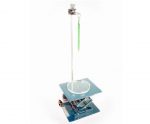Surface tension of liquids

Principle
The cohesive forces in a liquid generate tension on its surface, the so-called surface tension. A metal ring that is plunged into a liquid is withdrawn from the liquid. At a certain tensile force, the liquid film will be disrupted from the ring. Based on the tensile force and ring diameter, the surface tension of a liquid can be calculated
Benefits
- High sensitivity measurement possible thanks to ring method
- Analogue set-up that can also be used as a demo experiment in the lecture hall
- Interdisciplinary use also in applied sciences or physical chemistry
Surface tension measuring ring
Water, distilled 5 l
Petri dish, d 150 mm, glass
Tripod base PHYWE
Support rod, stainless steel, 750 mm
Rod with hook
Lab jack, 200 x 200 mm
Spring balance, transparent, 0,2N
Right angle clamp expert
Task
Examine the surface tension of a liquid.
What you can learn about
- Wetting and non-wetting liquids
- capillarity

